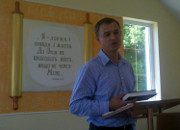
Russia (MNN) — Concern grows as Russia expands its ongoing nationwide investigation to churches.
In March, European Union (EU) officials raised concern as tax raids on foreign-funded non-governmental organizations (NGOs) increased. A month earlier, Russian President Vladimir Putin warned these groups against "meddling" in Russian politics.
The ongoing hubbub traces back to a law passed in July 2012. It requires NGOs who receive foreign funds to register with the state as "foreign agents," a term carrying negative Soviet-era implications.
"I have expressed concerns about this [law], and I think it is very important…how political activity is being defined," secretary-general of the Council of Europe, Thorbjorn Jagland, told Putin last week.
"I have said to my counterparts that I am very concerned with [the term] 'foreign' agent because it is very sensitive wording. And it can have a chilling effect on the NGO community, particularly if this law is not being put into practice in the right manner."
Joel Griffith of Slavic Gospel Association says certain aspects play a key role in government investigations.
"What sort of foreign level of support would these specific groups be getting, and then what is being done with that foreign support? Is it simply ministry, or is there a political context to it?" Griffith wonders.
According to Forum 18 News, religious communities are falling under the microscope, even though these regulations don't technically apply to them.
"But because they fall under the category of NGOs, they were included in this sweep," Moscow-based lawyer Konstantin Andreyev told Forum 18.
Hundreds of religious organizations were examined in recent NGO check-ups by Russian authorities. Forum 18 says the examinations ranged from a simple request for documents made over the phone to extensive searches.
No official statistics were recorded, but approximately 400 Pentecostal churches and congregations have been checked nationwide over the last two months.
Churches helped by SGA are in the clear so far.
"The churches that we serve there are focused on the Gospel and not politics, so we'll just have to keep a watchful eye on this," says Griffith.
But searches today could always mean less religious freedom tomorrow. Pray.
"Leaving the politics aside from the question, pray with us that evangelical churches would continue to have the freedom to worship and proclaim the Gospel," Griffith requests.
"Pray for the churches that are existing in Russia and her neighboring countries, and pray for the unhindered advance of the Gospel."
SGA exists to serve churches belonging to the Union of Evangelical Christians-Baptists (UECB) in Russia and surrounding nations. To learn more about their ministries and how you can come alongside their work, click here.
